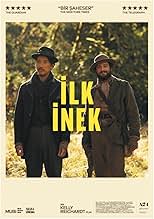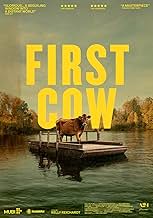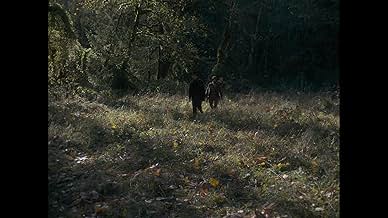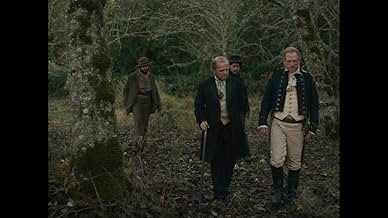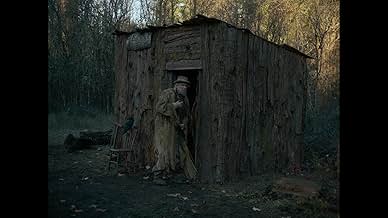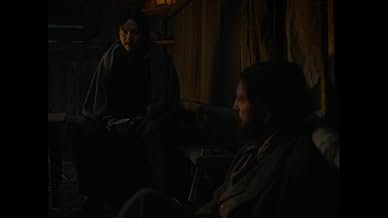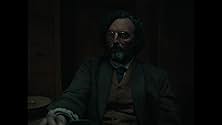IMDb रेटिंग
7.1/10
23 हज़ार
आपकी रेटिंग
एक कुशल रसोइया ने पश्चिम की यात्रा की है और ओरेगॉन में फर ट्रैपर्स के एक समूह में शामिल हो गया है, हालांकि उसे केवल एक चीनी आप्रवासी के साथ सच्चा संबंध मिलता है जो अपने भाग्य की तलाश में है.... सभी पढ़ेंएक कुशल रसोइया ने पश्चिम की यात्रा की है और ओरेगॉन में फर ट्रैपर्स के एक समूह में शामिल हो गया है, हालांकि उसे केवल एक चीनी आप्रवासी के साथ सच्चा संबंध मिलता है जो अपने भाग्य की तलाश में है. जल्द ही दोनों एक सफल व्यवसाय में सहयोग करते हैं.एक कुशल रसोइया ने पश्चिम की यात्रा की है और ओरेगॉन में फर ट्रैपर्स के एक समूह में शामिल हो गया है, हालांकि उसे केवल एक चीनी आप्रवासी के साथ सच्चा संबंध मिलता है जो अपने भाग्य की तलाश में है. जल्द ही दोनों एक सफल व्यवसाय में सहयोग करते हैं.
- पुरस्कार
- 21 जीत और कुल 141 नामांकन
Rene Auberjonois
- Man with Raven
- (as René Aubergenois)
Kevin Michael Moore
- Fort Trapper
- (as Kevin-Michael Moore)
फ़ीचर्ड समीक्षाएं
"It's the getting started that's the puzzle. No way for a poor man to start. ... You need capital, or you need some kind of miracle."
"You need leverage."
"Or a crime."
Another excellent Western from Kelly Reichardt, one with high production quality and which quietly subverts the genre's traditional themes. That starts with the two protagonists, King-Lu and Cookie (Orion Lee and John Magaro) who are rational, somewhat timid guys who hit on a plan to make a fortune via baked goods (yes, baked goods). Cookie is quite the domestic for the hero of a Western, and can crank out a clafoutis if necessary. The buddy he meets, King-Lu, is from China but is the antithesis of stereotypical representations, having traveled the world and multi-lingual, including English and the local Native American dialect. How fantastic is it that these guys aren't macho gunslingers, that they cook, sew, sweep the house, and forage while trying to figure out how to take advantage of this "land of riches." Meanwhile, the Native Americans themselves aren't blood-thirsty savages, they're people and they co-exist with the colonizers, which is reasonably accurate for the 1820's, a few decades before mass colonization would lead to genocide.
Despite the relative harmony, there is a quiet, rather ominous danger everywhere, from a bully in the fur trapping group promising to wait outside the fort after Cookie is paid to rob him, to King Lu describing how his friend was gutted from neck to loin because he was suspected of being a thief, to the more powerful men who debate how many lashes are appropriate in corporal punishment which is clearly at their discretion. There is no real law and order here, just force, and might makes right. At the same time, Reichardt is incredibly restrained in not showing a lot of violence, or reveling in it as a lesser director might have done.
Meanwhile, the message comes through that the West wasn't won with frontier spirit or some other aspect of mythical American exceptionalism, it was won with crime. Sure, the two mild-mannered fellas with big dreams steal milk from a rich guy's cow to make some delicious oily cakes, setting up a pop-up food stall (ok food blanket) that's quite popular with the locals, enriching themselves in the process. But the rich guy is stealing resources from the Native Americans and idiotically believes that the beaver can be trapped without limit. When he's told by King-Lu how vast the original beaver population was in the state, he can't extrapolate what greed will do to the population eventually, or doesn't want to (and indeed, the beaver was almost driven to extinction in Oregon). The little thieves end up in shallow graves, the big thief ends up likely lauded in the state's history, with a town probably named after him.
The first cow (fantastically played by Evie the cow btw) is thus a symbol of the natural order shifting, and in a profound way. Early on in a small saloon, one man remarks "This ain't a place for cows. God would've put cows here if it was." Another replies "No place for white men either then." It's notable that the cow is there so a rich man can have cream in his tea, and so he can display his status and sophistication to visitors who might look down on his rustic surroundings. It's a luxury, and reserved for him alone. It's the tip of an enormous iceberg, of many more white men with their precious possessions, of a lifestyle that will ravage the environment for the sake of personal wealth. In the opening shot in the present day, an enormous (and very ugly) cargo barge is seen going down the river. It's a shot I almost forgot by the time the film ended, but it seems to show in a subtle way the result of 200 years of such a lifestyle.
That's an aspect of Reichardt's direction I admire most, just how much she holds back and lets the viewer think about. There is a powerful message here, but it's delivered with great subtlety. Most of the scenes are played without a soundtrack in the background, and she doesn't feel a need to include shots to fill everything in for the viewer. There were places where I felt the film could have moved along a little more quickly and it won't be for everyone, but the more I thought about it afterwards, the more I appreciated what she had done.
Another excellent Western from Kelly Reichardt, one with high production quality and which quietly subverts the genre's traditional themes. That starts with the two protagonists, King-Lu and Cookie (Orion Lee and John Magaro) who are rational, somewhat timid guys who hit on a plan to make a fortune via baked goods (yes, baked goods). Cookie is quite the domestic for the hero of a Western, and can crank out a clafoutis if necessary. The buddy he meets, King-Lu, is from China but is the antithesis of stereotypical representations, having traveled the world and multi-lingual, including English and the local Native American dialect. How fantastic is it that these guys aren't macho gunslingers, that they cook, sew, sweep the house, and forage while trying to figure out how to take advantage of this "land of riches." Meanwhile, the Native Americans themselves aren't blood-thirsty savages, they're people and they co-exist with the colonizers, which is reasonably accurate for the 1820's, a few decades before mass colonization would lead to genocide.
Despite the relative harmony, there is a quiet, rather ominous danger everywhere, from a bully in the fur trapping group promising to wait outside the fort after Cookie is paid to rob him, to King Lu describing how his friend was gutted from neck to loin because he was suspected of being a thief, to the more powerful men who debate how many lashes are appropriate in corporal punishment which is clearly at their discretion. There is no real law and order here, just force, and might makes right. At the same time, Reichardt is incredibly restrained in not showing a lot of violence, or reveling in it as a lesser director might have done.
Meanwhile, the message comes through that the West wasn't won with frontier spirit or some other aspect of mythical American exceptionalism, it was won with crime. Sure, the two mild-mannered fellas with big dreams steal milk from a rich guy's cow to make some delicious oily cakes, setting up a pop-up food stall (ok food blanket) that's quite popular with the locals, enriching themselves in the process. But the rich guy is stealing resources from the Native Americans and idiotically believes that the beaver can be trapped without limit. When he's told by King-Lu how vast the original beaver population was in the state, he can't extrapolate what greed will do to the population eventually, or doesn't want to (and indeed, the beaver was almost driven to extinction in Oregon). The little thieves end up in shallow graves, the big thief ends up likely lauded in the state's history, with a town probably named after him.
The first cow (fantastically played by Evie the cow btw) is thus a symbol of the natural order shifting, and in a profound way. Early on in a small saloon, one man remarks "This ain't a place for cows. God would've put cows here if it was." Another replies "No place for white men either then." It's notable that the cow is there so a rich man can have cream in his tea, and so he can display his status and sophistication to visitors who might look down on his rustic surroundings. It's a luxury, and reserved for him alone. It's the tip of an enormous iceberg, of many more white men with their precious possessions, of a lifestyle that will ravage the environment for the sake of personal wealth. In the opening shot in the present day, an enormous (and very ugly) cargo barge is seen going down the river. It's a shot I almost forgot by the time the film ended, but it seems to show in a subtle way the result of 200 years of such a lifestyle.
That's an aspect of Reichardt's direction I admire most, just how much she holds back and lets the viewer think about. There is a powerful message here, but it's delivered with great subtlety. Most of the scenes are played without a soundtrack in the background, and she doesn't feel a need to include shots to fill everything in for the viewer. There were places where I felt the film could have moved along a little more quickly and it won't be for everyone, but the more I thought about it afterwards, the more I appreciated what she had done.
A positive surprise. At first the film feels that it doesnt know where it goes and shows a VERY detailed introduction of its two protagonists. But detail is the key word for this newest feature by Kelly Reichardt. The visuals are extremely detailed and so are the characters in general. We get a lot of information just by watching them in their daily lives and slowly the plot thickens and has some unexpected turns. Kelly Reichardt really did a fantastic job telling that story. She proves a fantastic eye for visuality, showing off some fantastic nature shots that really add a lot to the atmosphere of the film. She did everything right with this film, although she might once in a while loses herself a little bit too much in her details. The actors were wisely chosen and the leading roles filled with rather unknown actors who are usually in secondary roles. First of all there is John Magaro who is very subtle and effective. The better performance came from Orion Lee who is extremely charismatic and does a lot with the role given to him. I think he might have a very interesting future. I loved how he handled that role and gave it many different facettes. There is a good supporting performance by Toby Jones who does wonders with his rather one dimensional character. Ewen Bremner is a bit wasted, but not as much as Lily Gladstone which was insulting. Gladstone was brilliant in Reichardt's previous film, and ended up in my Top 5 Supporting Actresses so I was shocked how misused she was in this film. But thats just one of the very few flaws the film that. Another very positive note goes to the score, which is fantastic and as mentioned before the cinematography. Give it a try and try to read as less as possible about it so you have the chance to perfectly soak into it.
For those viewers who believe the pace of the film is "slow", yes, there are no car chases. Instead, this film has a depth of character and original development that creates a mood so beautifully of the time and place. It is refreshing to have a plot that keeps the viewer's interest throughout. When the majority of movie offerings out there are pure trash, this film is a real treat.
It may be because of how I watched this - First Cow and Reichardt's films in general call for seeing it in a cinema if at all possible, she simply has that eye and ear for the minutest details and for the time she takes with every shot and many scenes to draw out the feeling of a place as well as for the actors to settle in, that you want to sink in to this film as a sensory experience, and instead I saw it at home where (I don't know about you but) I have too many distractions, not least of which the phone on a busy weekday - but it took me about fifteen to twenty minutes or so to get into the mood of this film. I wasn't sure if it might go anywhere really, as it follows the Cookie character as he is part of this fur trapping outfit (or almost on the outside, just barely with it, but enough to be in it without, say, getting into scraps/fights like the others), and it was frankly slow-going.
But then the story, as much as it is, kicks in and it becomes this very simple tale of a friendship and what may be a fairly minor crime in the grand scheme of things - taking milk from a cow that isn't there's so they can make oily cakes, basically the 1820's rural Oregon equivalent of what I assume is Krispy Kreme - and how it gets tested and firms as they become more successful and gain the employ of the wealthiest man in the area (Toby Jones), who... also happens to own the cow that they've been milking. It's so engrossing because of its simplicity, the delicacy and yet the immediacy of the world that Reichardt has recreated for us. Like all the best period filmmakers, she and her collaborators bring this part of America/the Pacific North-west to life in almost a humble sort of way: it isn't ostentatious, it's just... what it was, and that makes it special.
Aside from the performances themselves from these two, I have to wonder if the power of this film comes from something that maybe Reichardt was conscious of or maybe she wasn't, but this story makes me think about filmmaking itself, especially of the independent kind (or art creation in general). You have to assemble the right ingredients, and it most often takes some tenacity for it to all come together like it should (and how many times have you heard of someone on an indie movie shoot "going guerilla" or "stealing a shot" from some such and such a location they didn't have a permit for, etc). It feels like a story that Reichardt has lived at some point in her life, and she gets to deepen on the themes she worked in on Old Joy, also about a male friendship that gets tested by cirumstance.
And what's fascinating is how because of the slow-burn-ness of the pacing, by the time it gets to the last half hour or final quarter, it has some real suspense as we wonder how our two great lawbreakers will get out of this as they get hunted down. It's not quite to the same level of poetic grungy-frontier depiction heights as a McCabe & Mrs. Miller, but it has that same looseness and understanding about humanity, and if anything is less pessimistic about equality between people of different backgrounds and races. What happens after the end credits start to roll? I don't know, and I don't need to is the point - they've gotten through some s***, and they're together.
But then the story, as much as it is, kicks in and it becomes this very simple tale of a friendship and what may be a fairly minor crime in the grand scheme of things - taking milk from a cow that isn't there's so they can make oily cakes, basically the 1820's rural Oregon equivalent of what I assume is Krispy Kreme - and how it gets tested and firms as they become more successful and gain the employ of the wealthiest man in the area (Toby Jones), who... also happens to own the cow that they've been milking. It's so engrossing because of its simplicity, the delicacy and yet the immediacy of the world that Reichardt has recreated for us. Like all the best period filmmakers, she and her collaborators bring this part of America/the Pacific North-west to life in almost a humble sort of way: it isn't ostentatious, it's just... what it was, and that makes it special.
Aside from the performances themselves from these two, I have to wonder if the power of this film comes from something that maybe Reichardt was conscious of or maybe she wasn't, but this story makes me think about filmmaking itself, especially of the independent kind (or art creation in general). You have to assemble the right ingredients, and it most often takes some tenacity for it to all come together like it should (and how many times have you heard of someone on an indie movie shoot "going guerilla" or "stealing a shot" from some such and such a location they didn't have a permit for, etc). It feels like a story that Reichardt has lived at some point in her life, and she gets to deepen on the themes she worked in on Old Joy, also about a male friendship that gets tested by cirumstance.
And what's fascinating is how because of the slow-burn-ness of the pacing, by the time it gets to the last half hour or final quarter, it has some real suspense as we wonder how our two great lawbreakers will get out of this as they get hunted down. It's not quite to the same level of poetic grungy-frontier depiction heights as a McCabe & Mrs. Miller, but it has that same looseness and understanding about humanity, and if anything is less pessimistic about equality between people of different backgrounds and races. What happens after the end credits start to roll? I don't know, and I don't need to is the point - they've gotten through some s***, and they're together.
A story about two outcasts who find friendship and a business partnership with each other in the American frontier.
John Magaro plays a gentle baker who begins the movie as cook for a prospecting expedition. He's too thoughtful and sensitive to really fit in with the macho wild men he's with, who bully and threaten him. Orion Lee is a Chinese immigrant who befriends him and suggests that they go into business selling the baker's biscuits at a local trading post. The biscuits are a sensation, but the enterprise is a dangerous one -- the only place to get milk is to steal it from the cow (yes, THE cow, not A cow) that belongs to the local aristocrat, played by the always welcome Toby Jones. The film begins in the present day with a hiker in the woods discovering something that hints at how the movie will end, and how the movie then circles back to that find is a small miracle of narrative storytelling.
Kelly Reichardt, who's made a career of quiet, understated films, remains true to form here. "First Cow" shows much more than it tells, which should please fans of art house fare but will probably frustrate more casual moviegoers who have less patience for the way stories are told. The two main characters don't talk much, but we learn much about them, not from what they say, but from how they act. The first time we see Magaro's character, for example, he's hunting for mushrooms in the woods, and he takes the time to set a salamander he finds back on its feet when it's struggling to flip itself over. And when Lee's character shows him to his cabin in the woods, the first thing Magaro does is find some wildflowers with which to decorate the small space. Little flourishes like these reward the patient viewer, and we come to like the two men so much that the end, though we've been warned of it in advance, feels that much more tragic when it comes.
Covid has seen to it that 2020 hasn't exactly been the most robust year for movies, but of movies that have been released so far this year, "First Cow" is one of the best I've seen.
Grade: A
John Magaro plays a gentle baker who begins the movie as cook for a prospecting expedition. He's too thoughtful and sensitive to really fit in with the macho wild men he's with, who bully and threaten him. Orion Lee is a Chinese immigrant who befriends him and suggests that they go into business selling the baker's biscuits at a local trading post. The biscuits are a sensation, but the enterprise is a dangerous one -- the only place to get milk is to steal it from the cow (yes, THE cow, not A cow) that belongs to the local aristocrat, played by the always welcome Toby Jones. The film begins in the present day with a hiker in the woods discovering something that hints at how the movie will end, and how the movie then circles back to that find is a small miracle of narrative storytelling.
Kelly Reichardt, who's made a career of quiet, understated films, remains true to form here. "First Cow" shows much more than it tells, which should please fans of art house fare but will probably frustrate more casual moviegoers who have less patience for the way stories are told. The two main characters don't talk much, but we learn much about them, not from what they say, but from how they act. The first time we see Magaro's character, for example, he's hunting for mushrooms in the woods, and he takes the time to set a salamander he finds back on its feet when it's struggling to flip itself over. And when Lee's character shows him to his cabin in the woods, the first thing Magaro does is find some wildflowers with which to decorate the small space. Little flourishes like these reward the patient viewer, and we come to like the two men so much that the end, though we've been warned of it in advance, feels that much more tragic when it comes.
Covid has seen to it that 2020 hasn't exactly been the most robust year for movies, but of movies that have been released so far this year, "First Cow" is one of the best I've seen.
Grade: A
क्या आपको पता है
- ट्रिविया"Slow Elk" was suggested as an alternate title, as that's how cattle were known to Oregon's First People. Also, "slow elk" is still a slang term for cattle used by big game hunters in some Western states; for example, "That out-of-stater shot a slow elk by mistake."
- गूफ़Cookie mentions he would like to have a business in San Francisco. The film is ostensibly set in the 1820s, when the city had not officially been named San Francisco. However, the name had been in use since the 1590s and could have been used at the time the film is set.
- क्रेज़ी क्रेडिटThe Cow - Evie
- कनेक्शनFeatured in WatchMojo: Top 10 Movies of 2020 (So Far) (2020)
टॉप पसंद
रेटिंग देने के लिए साइन-इन करें और वैयक्तिकृत सुझावों के लिए वॉचलिस्ट करें
विवरण
- रिलीज़ की तारीख़
- कंट्री ऑफ़ ओरिजिन
- आधिकारिक साइट
- भाषाएं
- इस रूप में भी जाना जाता है
- İlk İnek
- फ़िल्माने की जगहें
- उत्पादन कंपनियां
- IMDbPro पर और कंपनी क्रेडिट देखें
बॉक्स ऑफ़िस
- US और कनाडा में सकल
- $1,01,068
- US और कनाडा में पहले सप्ताह में कुल कमाई
- $81,323
- 8 मार्च 2020
- दुनिया भर में सकल
- $13,80,888
- चलने की अवधि
- 2 घं 2 मि(122 min)
- रंग
- पक्ष अनुपात
- 1.37 : 1
इस पेज में योगदान दें
किसी बदलाव का सुझाव दें या अनुपलब्ध कॉन्टेंट जोड़ें





